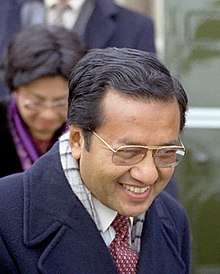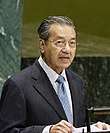Daim Zainuddin
Tun Dr. Abdul Daim bin Zainuddin (Jawi: عبدالدائم بن زين الدين; born 29 April 1938 in Alor Setar, Kedah) is a Malaysian politician, businessman and former Finance Minister of Malaysia from 1984 to 1991.
Abdul Daim Zainuddin | |
|---|---|
دائم زين الدين | |
| Minister of Finance | |
| In office 14 July 1984 – 15 March 1991 | |
| Monarch | Iskandar Azlan Shah |
| Prime Minister | Mahathir Mohamad |
| Deputy | Sabbaruddin Chik Oo Gin Sun Ng Cheng Kiat Wan Abu Bakar Wan Mohamad Loke Yuen Yow Abdul Ghani Othman (1990-1991) |
| Preceded by | Tengku Razaleigh Hamzah |
| Succeeded by | Anwar Ibrahim |
| Constituency | Merbok |
| In office 7 January 1999 – 31 May 2001 | |
| Monarch | Ja'afar Salahuddin |
| Prime Minister | Mahathir Mohamad |
| Deputy | Wong See Wah (1999) Mohamed Nazri Abdul Aziz (1999) Shafie Salleh (1999-2001) Chan Kong Choy (1999-2001) |
| Preceded by | Mahathir Mohamad |
| Succeeded by | Mahathir Mohamad |
| Constituency | Merbok |
| Member of the Malaysian Parliament for Merbok | |
| In office 1986–2004 | |
| Preceded by | New constituency |
| Succeeded by | Zainuddin Maidin |
| Majority | 13,745 (1986) 15,843 (1990) 22,201 (1995) 15,376 (1999) |
| Member of the Malaysian Parliament for Kuala Muda | |
| In office 1982–1986 | |
| Preceded by | Khir Johari |
| Succeeded by | Constituency abolished |
| Majority | 14,058 (1982) |
| Personal details | |
| Born | Abdul Daim bin Zainuddin 29 April 1938 Alor Setar, Kedah, British Malaya (now Malaysia) |
| Political party | United Malays National Organisation (UMNO) (until 2018) Malaysian United Indigenous Party (BERSATU) (2018–present) |
| Other political affiliations | Barisan Nasional (BN) (until 2018) Pakatan Harapan (PH) (2018–present) |
| Spouse(s) | Mahani Idris |
| Children | 5 |
| Occupation | Politician, businessman |
| Website | daimzainuddin |
Early life
Daim bin Zainuddin is the youngest of thirteen siblings. His father was a clerk in the Kedah State Service and his mother a homemaker Zainuddin Affan & Hasimah Hassan. Daim received his early education at the Malay Primary School in Seberang Perak, Alor Setar and then advanced to the Special Malay Class at the Sultan Abdul Hamid College, which was an English–medium school.
Educations
Being a youth of the 40s, during a period when the British Colonial Policy encouraged Malays to attend Malay schools, when Malay parents worried about the possible influence of an English education on their children's religious faith and cultural identity, Daim and his parents were able to transcend these limitations. In fact, his broad-minded parents enrolled all their children at English–medium schools as they did not want their children to become "better farmers and fishermen". However, Daim was very much an absentee student. He had worked out a strategic studying method whereby he would only need to focus on subjects that he would need to pass to advance to the next class and that required little effort – English and Malay languages and Mathematics. He devoted his free time to pursuing his main interest which was sports and more sports.
Career-wise, Daim would have ended up as a teacher except that due to some miscommunication he had been totally unaware that his name was on the list of successful candidates for Brinsford College, England, a teacher training college.
Throughout his youth, he was very much encouraged by a mother who wanted him to further his studies and a father who wanted him to become a lawyer. His mother sold some land to raise money for him to study law in England. Realizing that "time is money", the former absentee student became a diligent and disciplined scholar in law who after eighteen months at Lincoln's Inn London and at the youthful age of 21, was called to the English Bar in 1959. It was also during his student days in London that he developed his voracious appetite for reading which till today is his favourite pastime.
In 2019, Daim at the age of 81 after retirement, working on the thesis regarding the New Economic Policy for 11 years finally obtained his Doctor of Philosophy (PhD) degree from Universiti Malaya (UM).[1]
Early career
Upon his return to Malaysia from England after his studies, he started reading in the chambers of Pillai & Co. and later, the chambers of Shearn Delamore which was then the largest law firm in Kuala Lumpur. In 1961, he decided to move and work in Kota Bharu, Kelantan under the tutelage of Encik Wan Mustaffa who was legal adviser to the Pan-Malaysian Islamic Party (PMIP) which later became known as Parti Islam Se-Malaysia (PAS). After his stint in Kota Bharu, he joined the Malaysian Civil Service as a Magistrate, then became the President of the Sessions Court in Johor and subsequently became Deputy Public Prosecutor in Ipoh, Perak. He resigned from the service in 1965, returned to Kuala Lumpur and joined the law firm of Allen & Gledhill for the next three years till his resignation in 1968 to start his own law practice of Daim & Gamany. In 1969, however, he decided to venture into business.
Business
His first business venture was in salt production, partly because it seemed easy and partly because his partner's feng shui indicated that he should work with water. They went to Thailand, Taiwan and Japan to study salt production, weather forecast, soil condition and location. During the start-up they proceeded to clear 600 acres (2.4 km2) of the coastal land of Kuala Selangor, but because the rain came unseasonably early just when the salt had begun to crystallise, they were almost bankrupted by it.
Daim's great break was in 1971, when he decided to venture into land and property development. Together with two other partners, he formed a company, Syarikat Maluri Sdn Bhd of which he held a 60% majority control. The Company bought and developed Taman Bukit Maluri, Kepong and Daim became the first full-fledged Malay property developer in Kuala Lumpur. Having ventured into a predominantly Chinese sector, he might have expected to encounter insurmountable problems, but he did not, because it was 1971 that the then Prime Minister Tun Abdul Razak introduced the New Economic Policy that was an ambitious and controversial socio-economic restructuring affirmative action program. The NEP targeted a 30% share of the economy for the Bumiputera. Hence, being only a handful of Bumiputeras involved in this sector, Daim naturally gained advantages from the Government over his Chinese counterparts.
His next venture was in plastics production. After he obtained a license however, another two licenses were issued and this instigated early and keen competition to Daim's fledgling company. Furthermore, the workers were incited to strike and eventually the venture proved to be another bankrupting business. Fortunately, his other downstream ventures which included the plastic packaging company, Daibochi and the snack food factory, Sedap Food flourished and were later listed on the Kuala Lumpur Stock Exchange (KLSE). He also invested in the Ports' downstream business with stevedoring, forwarding and low-loader licenses and had set up a manufacturing plant making steel and iron products like manhole covers and telephone posts. The success of these ventures helped towards offsetting loans and borrowings of the failed venture. After gaining a foothold in the property business, he began to look for other challenges to pursue and to prove that a Malaysian of Malay ethnicity could succeed in other fields. At the same time, other corporate and political stars were rising and Daim wanted to be "the Malay to do it" and so, he forged ahead and bought a 30% equity interest in United Estates Project (UEP) now known as Sime Darby–UEP (developer of the popular 'Subang Jaya' township) and went on picking up stakes in the share market, mostly strategic rather than controlling stakes.
He was willing to take risks but also saw opportunities before others. When President François Mitterrand of France came into power and decided to nationalise all French banks, Daim saw an opportunity whilst others were grumbling about the new socialist policies. He knew that Malaysian banking regulations did not allow for government-owned banks to operate in Malaysia and therefore knew that Bank Indo-Suez will either have to close its operations in Malaysia or be sold-off. He wrote a 'cold-call' letter to the chairman/President of the Bank registering his interest in the event that they would want to sell. Of course rather than closing down the Bank they decided to sell to Daim and in 1981 he became the owner of Indo-Suez later renamed the Malaysian-French Bank. Later when United Malayan Banking Corporation (then the 2nd largest bank in Malaysia) became available, he exchanged his majority stake in Malaysian-French Bank for a smaller stake in this larger bank.
Political career
In 1984 he was appointed Minister of Finance. He never lost his love for the banking industry and after he retired he started investing in small banks overseas in Europe and Africa. As the business expanded, the banks needed to be organised under a bigger parent bank and he therefore acquired Hock Hua Bank (which he renamed International Bank of Malaysia Berhad) which was one of the smallest banks in Malaysia. Again he had to dispose of his stake when he was reappointed Minister of Finance in 1998. After his second retirement he is now again actively involved in the banking industry.
Apart from business, politics have always interested Daim. His earliest exposure was as a student in London whereby though not actively involved in politics, he shared his fellow students interests in the political issues of the day particularly independence and post-independence implications on the socio–economic and religious mosaic of pluralistic Malaysia.
His first encounter with real politics albeit covertly was when in 1966, as a lawyer with Allen & Gledhill, the firm was appointed by the Federal Government of Malaysia to act for the Governor of Sarawak in a case against the Chief Minister of that State. Back in Kuala Lumpur, Daim was asked to attend a Cabinet meeting whereat he briefed the Cabinet members of the political situation in Sarawak and impressed upon the Cabinet the need for emergency to be declared to avert a worsening of the situation caused by the demonstrations against the Chief Minister's minority government. Emergency was declared. However, the security risk persisted and the Governor as advised by the central government suspended the Standing Orders of the House and called for a meeting of the Assembly using emergency powers. Daim assisted in drafting the statement of the Governor that the Assembly was to debate; the Assembly met, the Chief Minister's government was voted out of office. Impressed by his legal skills and political knowledge, the Prime Minister offered Daim a seat in Sungai Petani in the 1974 general elections but Daim declined, choosing instead to establish his credentials in business.
Come 1977, Daim decided that he was financially comfortable enough to retire. His retirement plan then was to go back to school and so he enrolled at University of California Berkeley to pursue a course in Urban Planning. At around the same time, he enjoyed a close rapport with the then Deputy Prime Minister Tun Dr. Mahathir Mohamad.
In 1978, Daim met Mahathir in Los Angeles and San Francisco, when Mahathir urged Daim to return to Malaysia and contest in the general election that year. At the same time, Daim was also offered the Chairmanship of the Urban Development Authority (UDA) by the Public Enterprises Minister. Daim was not interested in taking up the Chairmanship of UDA which he deemed too big and widespread, too bureaucratic and doing too many things at the same time. Instead he suggested that UDA should form a holding company and transfer all its commercial property and commercial assets to it; only then would be agree to manage it. Hence, Peremba was established and Daim became its non-executive chairman with a team of young and bright hand–picked officers assisting him. While not many could take his punishing rigours and demands of work and discipline, those who did went on to become successful entrepreneurs and notable amongst these were Tan Sri Wan Azmi Bin Wan Hamzah, Tan Sri Halim Bin Saad, and Tan Sri Samsuddin Bin Abu Hassan. In 1980, Daim was informed that the Prime Minister Tun Hussein Onn had appointed him as Senator in the Upper House of Parliament.
When Mahathir became Prime Minister in 1981, he sent Daim on a number of missions. The first was to the United States of America (USA) to deal with the problem posed by the USA's General Services Administration (GSA) tin stockpile releases which caused the price of tin to tumble, thus adversely affecting the Malaysian tin industry, it being a major producer of tin. Knowing that the tin miners' hardship would not move the Americans but that the communist threat would, Daim decided to take on this hard line in his negotiations with them. It worked and the GSA agreed to limit their stockpile releases to 3,000 tonnes a year for three years.
In 1981, the Government of Malaysia announced the adoption of the 'Buy British last' policy which actually was a culmination of a series of problems with the United Kingdom (UK). Prevalent was a new spirit of Malaysian nationalism which was manifested in the acquisition of Guthrie Estate by Permodalan Nasional Berhad, the Government–owned national equity corporation; the return of Seri Carcosa (premises which had been given to the British by Tunku Abdul Rahman Putra Al–Haj, Malaysia's first Prime Minister;) and the steep hike in fees of British Universities. To this day, very few Malaysians are aware that Daim was instrumental in working behind the scenes to resolve these issues and restore good relations with the British.
However, the event that truly launched Daim's political career was the day before nominations for the 1982 General Elections, when Mahathir rang Daim to say that he was to contest the Kuala Muda Parliamentary seat. Within the short span of the next two years, his rise in politics was meteoric as he was appointed the Minister of Finance in 1984. At that same time the burgeoning economy kept up its momentum despite the high rate of borrowing and spending to keep the economy healthy. The full impact of the world recession on Malaysia was only felt in 1985. Internally too, there were many abuses involving the financial institutions brought about by lack of proper supervision and control. By the time he took over, Daim could not avert the scandals, crisis and failures. However, Daim set about implementing a strict code of monetary and financial management to prevent the disease from becoming terminal for the whole economy.
He stopped the practice of borrowing to beef up funds for spending, he curtailed expenditure to suit income, he slashed the allocation for the public sector – upsetting many quarters. In the years 1987, 1988 and 1989, Malaysia paid off about RM6.8 billion of her foreign debts which was earlier than scheduled, a record repayment for developing nations. The Far Eastern Economic Review, which had made dire predictions about Malaysia's economy in 1986, admitted in its issue of 1 September 1988 that Daim's effective management style had contributed positively and tremendously to Malaysia's economic recovery.
Daim resigned as Finance Minister in March 1991, and the news caused a stir both in Malaysia and abroad because it was not in the Malaysian culture to resign from a high office. Therefore, when it happened there was a great deal of speculation as to why, and of course the most prominent was that which cited the irreconcilable differences with the Prime Minister, Tun Dr. Mahathir Mohamad. For Daim, the reason was that he had accomplished his tasks – reorganised and improved the country's financial position. Further, the Prime Minister reiterated by saying that "Daim had agreed to take the post on condition that he stay only to help reorganize and improve the country's financial position. He said he had fulfilled this task and it was time I let him go." In accepting his resignation, the Prime Minister also welcomed his readiness to contribute his ideas to the nation. To crown it all, the Prime Minister recommended Daim for the "Tun" title – the highest honour of the land. And so on 5 June 1991, the Yang di-Pertuan Agong Sultan Azlan Shah conferred on Daim the Seri Setia Mahkota award, which carries the title "Tun".
Prior to his resignation, in 1991, Daim's contribution was succinctly summed up as thus: “Despite having much of his tenure clouded in controversy, the outgoing Finance Minister has nonetheless earned the reputation as one of the country’s ablest economic architects, having steered Malaysia through recession into four straight years of high growth.” In another article, “Daim exits office having earned the distinction of being a hard–driving technocrat, who resisted pressure by rival ministers who wanted to alter fiscal policy for political expediency ….”
It was also recognised that during his tenure as the Finance Minister, Daim had implemented four broad strategic structural reforms during the 1986 to 1991 period namely the mobilisation of the private sector, active external policies, the supportive role of the private sector and the rehabilitation of the public enterprises. To this day, the tenets of his economic policies are held in high esteem and are continually pursued to either jump start or sustain the Malaysian economy.
Although technically out of the Government, Daim was still perceived as a man to be reckoned with – an entity greater than the sum of his overt responsibilities when he was appointed Economic Advisor to the Government, Chairman of the Northern Growth Triangle, the Labuan Development Authority and the Langkawi development Authority and also the Treasurer of the United Malays National Organisation (UMNO), the leading party in Malaysia's ruling coalition, Barisan Nasional (National Front). He was also Malaysia's representative to the East Asean Growth Area (EAGA).
In 1997 when the Asian crisis swept through Asia leaving behind devastated economics in its wake, Daim Zainuddin was recalled to public service.
On 5 May 2018, Daim was sacked from UMNO together with party veterans; Rafidah Aziz and Rais Yatim for supporting Mahathir Mohamad and opposition Pakatan Harapan (PH).[2][3][4]
Prime Minister Tun Dr Mahathir announced that Daim was appointed chief of the five-members in the Council of Eminent Persons (CEP), which served as advisors to the new government under PH after the coalition won the 2018 general elections.[5] Daim declared the council which had held its final meeting on 17 August 2018, has ended its 100-day term as it has fulfilled the mandate given to it within the specified period.[6][7]
Election results
| Year | Constituency | Government | Votes | Pct | Opposition | Votes | Pct | Ballots cast | Majority | Turnout | ||
|---|---|---|---|---|---|---|---|---|---|---|---|---|
| 1982 | Kuala Muda, Kedah | Daim Zainuddin (UMNO) | 21,782 | 73.82% | Ghazali Din (PAS) | 7,724 | 26.18% | 30,570 | 14,058 | 76.79% | ||
| 1986 | Merbok, Kedah | Daim Zainuddin (UMNO) | 20,712 | 74.83% | Redhuan Oon (PAS) | 6,967 | 25.17% | 28,495 | 13,745 | 70.12% | ||
| 1990 | Daim Zainuddin (UMNO) | 25,749 | 72.22% | Mohd Johari Abidin (S46) | 9,906 | 27.78% | 36,831 | 15,843 | 72.71% | |||
| 1995 | Daim Zainuddin (UMNO) | 31,125 | 77.72% | Maheran Muktar (S46) | 8,924 | 22.28% | 41,941 | 22,201 | 70.56% | |||
| 1999 | Daim Zainuddin (UMNO) | 30,285 | 67.01% | Mocktar Mansor (KeADILan) | 14,909 | 32.99% | 46,599 | 15,376 | 73.19% | |||
Honours



.svg.png)






References
- "PhD for Daim Zainuddin on the New Economic Policy". Bernama. Free Malaysia Today. 13 October 2010. Archived from the original on 8 December 2019. Retrieved 21 November 2019.
- "Malaysia election: Umno sacks two ex-ministers for backing opposition". New Strait Times. Archived from the original on 8 May 2018. Retrieved 7 May 2018.
- SUHAILA SHAHRUL ANNUAR and NOOR ATIQAH SULAIMAN (5 May 2018). "Daim, Rafidah, Rais sacked from Umno". New Strait Times. Archived from the original on 5 May 2018. Retrieved 7 May 2018.
- Sadho Ram (6 May 2018). "'Iron Lady' Rafidah Aziz And Two More UMNO Veterans Sacked For Supporting Pakatan Harapan". Says.com. Archived from the original on 8 May 2018. Retrieved 7 May 2018.
- Geraldine Tong (12 May 2018). "Daim, Zeti, Kuok, Hassan, Jomo named in advisory council". Malaysiakini. Archived from the original on 12 May 2018. Retrieved 12 May 2018.
- Manirajan Ramasamy, Masriwanie Muhamading (20 August 2018). "CEP has ended its tenure, says Daim". New Strait Times. Archived from the original on 10 August 2019. Retrieved 20 August 2018.
- "Malaysia's Council of Eminent Persons completes 100 days, to submit recommendations". Channel News Asia. 21 August 2018. Archived from the original on 20 October 2018. Retrieved 21 August 2018.
- "Keputusan Pilihan Raya Umum Parlimen/Dewan Undangan Negeri" (in Malay). Election Commission of Malaysia. Archived from the original on 6 September 2011. Retrieved 4 February 2017. Percentage figures based on total turnout.
- "Malaysia General Election". undiinfo Malaysian Election Data. Malaysiakini. Archived from the original on 15 February 2017. Retrieved 4 February 2017. Results only available from the 2004 election.
- "Senarai Penuh Penerima Darjah Kebesaran, Bintang dan Pingat Persekutuan Tahun 1991" (PDF). Archived (PDF) from the original on 8 August 2016. Retrieved 16 June 2016.
- "SEMAKAN PENERIMA DARJAH KEBESARAN, BINTANG DAN PINGAT". Prime Minister's Department (Malaysia). Archived from the original on 19 July 2019. Retrieved 18 September 2019.

